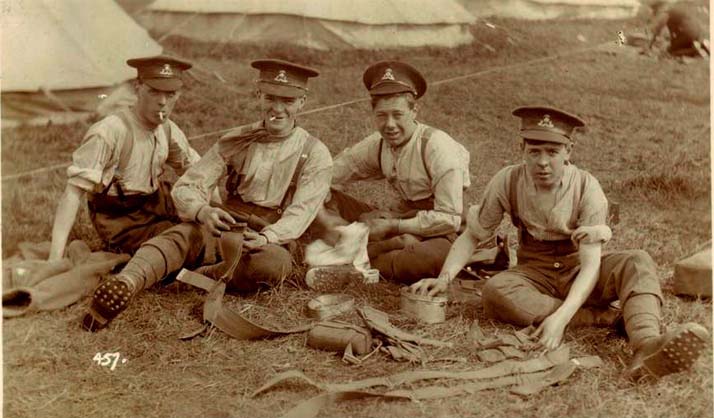In many ways the Manchester and Salford Pals were typical of Kitchener’s New Army of volunteers in 1914 and like so many others they played their part in one of the most devastating battles in our military history, the Battle of the Somme.
The Manchester Pals were born of a great city in 1914, a city still riding a wave of commercial success derived from dominance within Lancashire’s cotton trade, engineering excellence and growing diversity. Manchester’s industrial output was great than many European states. During the early days of The Great War the Manchester’s Pals were raised in optimism, confident in their prowess as the city’s finest men. this is the story of how they were enlisted, their self-assurance turned into military capability, and then deployed as part of Britain’s New Armies into a continental war which would ultimately consume them.
Within eight months of their arrival in France the pride of Manchester had been swept away the terrible hell which the 1916 Battle of the Somme became.
That first morning, they together with the other battalions were in the support trenches. One our after the battle began, they were over the top, an army made up of ware-housemen and clerks
An officer wounded in the battle gave an account to the London Correspondent of the Manchester Guardian:
“they had been disappointed that they had not been involved in any of the raiding operations that had proceeded the battle. While the bombardment was going on, some of the guns had been moved up close to the line and you saw them jumping up on the parapet and cheering and watching the show. A Sergeant did the Highland fling on top of the trench, two bullets from a German machine gun grazed his legs but he insisted on coming with us. At this time the reply from the German guns was feeble compared to ours. The noise was as such that although you could hear the German shells coming over, you could not hear them explode….An hour after the advance had stated and when it was calculated that the first three lines of the German trenches had been captured, The Pals got the order to go.”
The Pals advanced in small columns and the story continues:
“It was not until we were over our own trenches that we came under serious fire.As we were crossing the former no man’s land and the old first three lines of German trenches, we came under spasmodic shelling and caught it from a machine gun hidden in a wood on our left front. We advanced to within 500 yards of the village, suffering a number of casualties, the men showed no sign of discouragement, although the two or three leading men in each group had been hit. At this point we were obliged to halt while the artillery continued.After an hour we advanced in one wave reaching the southern end of the village. The men were going at a quick walk, almost going too fast. One or two parties were wiped out by the high explosive shells which were falling around us. When this happened. the men in the vicinity continued without stopping for a second. I can tell you they were jolly splendid, they went on so fast, I had to keep holding them back”
He continues:
” we reached the village with very few more casualties. I was wounded and had to take shelter in a bomb hole.I saw the battalion go right through the village and I waited for an hour to see whether they were pushed back or not. As none of them came back, I concluded they were firmly in position. All the time the Manchester’s were engaged in fierce hand to hand fighting in the village. They took hundreds of prisoners before having to stand a great counter attack, proceeded by very heavy shelling. They kept the Germans off with machine gun and inflicted very heavy losses”
The attack around the village of Mametz and the neighbouring village of Montauban was one of the few successes of that day, two of only four divisions whose initially assault on the enemy lines was a success
Salford was late in recruiting for its Pals battalions, with many of its men already joining Territorial units and a new Pals battalion in Manchester. Yet within a year of the outbreak of the war, it had raised four Pals battalions and a reserve battalion. Raised mainly from Lancashire’s most notorious slums, the men trained together in Wales, North East England and on Salisbury Plain, they had great expectations of success. On the 1st of July 1916 the Somme offensive was launched and in the very epicentre of that cauldron the first three of Salford’s battalions were thrown at the massive defences of Thiepval, as it would turn out some of the most strongly manned defences across the whole of the Western Front.
Almost a hundred buildings in the village had been turned into fortresses by the Germans, with machine guns covering all the approaches. Positioned around the village were about 30 machine guns — all with perfect views of the open slopes before them.The men were decimated, almost a thousand on that first day, the battalion almost wiped out. Those who managed to survive did so by either taking cover in the shell holes in no mans land and waiting until dark before crawling back to the safety of their own lines, or by managing to join up with the 36th Ulster Division south of the Schwaben Redoubt.
Many men lay in the middle of no mans land screaming out in agony. The German gunners constantly shelled the area making the task of trying to rescue the wounded almost impossible.The events would shake Salford to the core, plunging the City into mourning.
Within in a few hours on that first day, 19,240 British troops had been killed, out of a total of 57,470 casualties. Despite the costly first day, the Somme offensive continued for another four and a half months until 18 November 1916. It became a battle of attrition and over the 141 days of battle, the British took a strip of territory 10km deep and 32km long. Over the course of the battle over one million men from all sides were killed wounded or captured.







